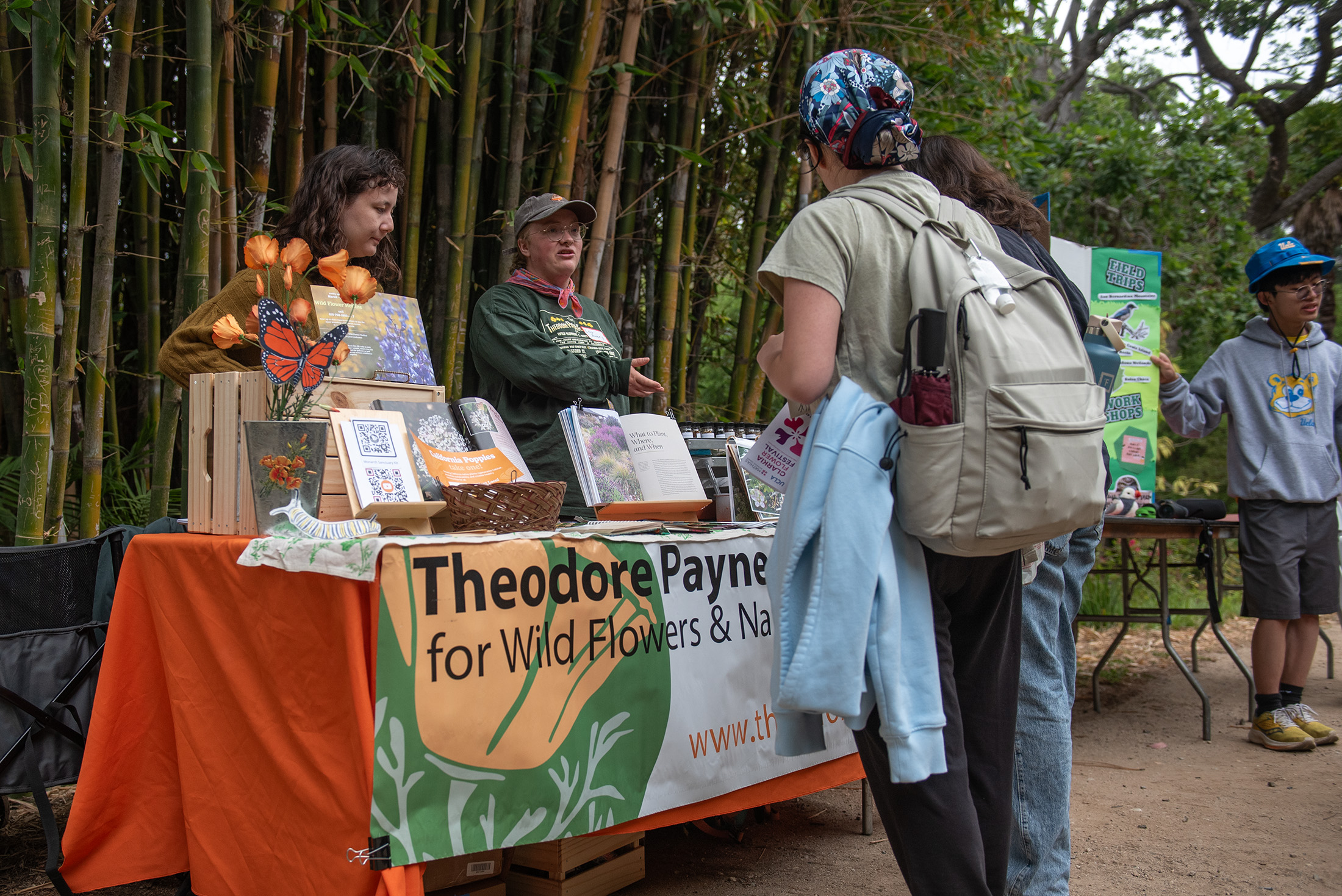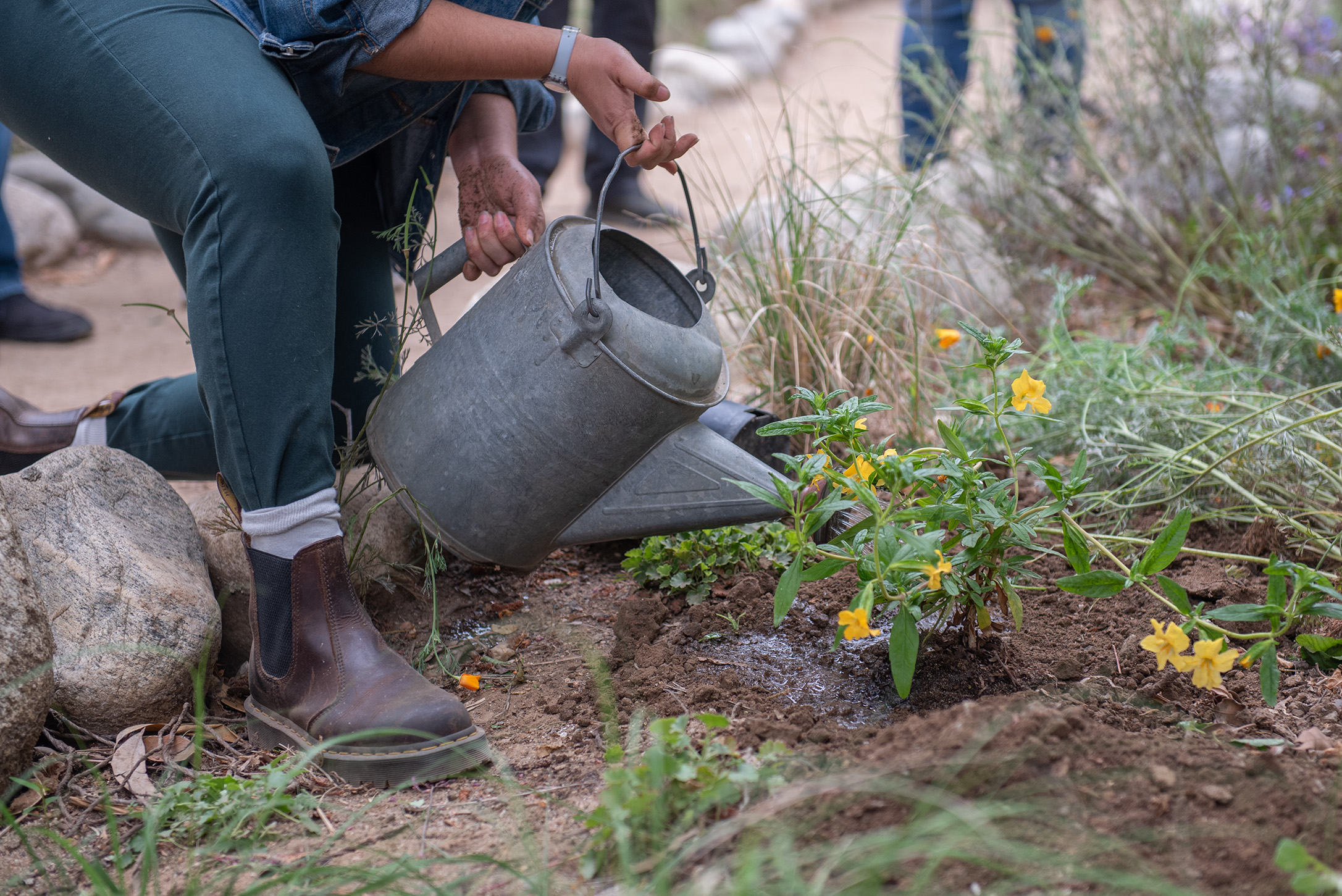Botanical garden Clarkia Flower Festival sows stories of history, Indigenous roots
Chief Anthony Redblood Morales of the San Gabriel Band of Mission Indians (second from left) stands with others at the opening ceremony of the Clarkia Flower Festival. The event celebrated the Clarkia genus of flowers, which have traditionally been used as a food source by some California tribes. (Max Zhang/Daily Bruin)
By Lucine Ekizian
May 25, 2025 9:42 p.m.
This post was updated May 27 at 12:59 a.m.
The Mildred E. Mathias Botanical Garden bloomed with history at the Clarkia Flower Festival on May 17.
The festival showcased the characteristics of the Clarkia flower – a native California wildflower that supports bees and other pollinators – alongside the botanical garden’s history and cultural ties. The festival featured vendors, guest speakers and live music provided by UCLA Radio.
“The garden obviously has a mission to support the teaching mission of this campus, but we also want to share our garden and our campus with the community,” said Victoria Sork, the botanical garden’s director. “The purpose of this festival is stated in our tagline, ‘Celebrating Community | Celebrating Flowers.’”
Kate Eisen, an assistant professor of biology at Loyola Marymount University and a guest speaker for the event, said in her talk that Clarkia is a genus thats 42 species are almost all native to California. She added in the talk that although the genus is named after a leader of the Lewis and Clark expedition, Indigenous groups in California used Clarkia as a substantial food source long before it received its current name.
Eisen said in her talk that the majority of Clarkia research began at UCLA under Harlan Lewis, a former dean of life sciences. Lewis’ research focused on the evolution and speciation of the genus, while current Clarkia research has expanded to focus on range limits, floral trait evolution and species interactions in addition to speciation, Eisen said in the talk.
Eisen added in her talk that Harlan Lewis’ wife, former UCLA Herbarium staff member Margaret Lewis, may have not gotten all of the credit she deserved for her research contributions.
“The logo of the garden is taking inspiration from Clarkia,” Eisen said in her talk. “What I want us to do here today is to get this appreciation that Clarkia is important as a genus, both in Indigenous communities and in different segments of the scientific community.”

Sork, a professor of ecology and evolutionary biology, said the festival is a reminder that the botanical gardens exist on the unceded territory of the Gabrielino-Tongva tribe. The festival had a blessing ceremony from Chief Anthony Redblood Morales, the chairman of the Gabrielino-Tongva Tribal Council.
Theresa Ambo, an associate professor of American Indian studies, and UCLA alumnus Todd Ambo gave a presentation on the artistic expression and weaving of Tongva baskets in relation to local native plants.
Theresa Ambo said in her talk that the introduction of the Spanish mission system in the late 18th century led to a lack of land and resources for Southern California tribes to gather materials for basket weaving. She added in the talk that following the end of the mission system, native weavers created a market economy out of basket weaving.
“Prior to this – the last, I would say, three years – traditional coil-style basketry was not practiced by our community,” Theresa Ambo said in the talk. “It really is a revival – something that we’ve been bringing back after dormancy for over a hundred years.”
She said in her talk that elders in her community have told her that baskets are utilitarian and have been used for storage, gathering, cooking and ceremonial purposes. Baskets follow community members from “cradle until grave” – an expression used to show the daily use and dependence on baskets, Theresa Ambo added in the talk.
Organizers encouraged attendees to separate stocks of Juncus textilis, a native California plant, to create basket-weaving strings. Todd Ambo said in the presentation that Juncus textilis – also known as basket rush – is vital to basket weaving, adding that the process of gathering materials takes a year, and the plants then need to be dried and dyed for basket weaving.
“It (basket weaving) shows an in-depth relationship with the environment and having ecological knowledge,” Theresa Ambo said during the talk. “There’s a spiritual component to it where I feel very connected to my ancestors.”
Graduate student Suu Zhou and doctoral student Joey Di Liberto, both UCLA ornithological researchers, gave a presentation titled, “Changing Behavior in Changing Cities: Shifting Trends in Urban Bird Behavior Across Seasons and Cityscapes.”

The Fowler Museum led a paper poppy-making activity, and more than 20 community partners – including Citizens for Los Angeles Wildlife and the Theodore Payne Foundation – tabled at the festival.
Maia Bowman, a third-year cognitive science student and festival attendee, said she feels lucky to have access to the botanical gardens and believes access to nature is key to happiness. She added that she appreciates the organizers of the festival for providing a variety of activities and wants to take advantage of the event opportunities as a student.
“Learning new things and being in nature are things that make everyone happy,” Bowman said. “They’re fulfilling, and they make you feel small and big at the same time and part of something.”
